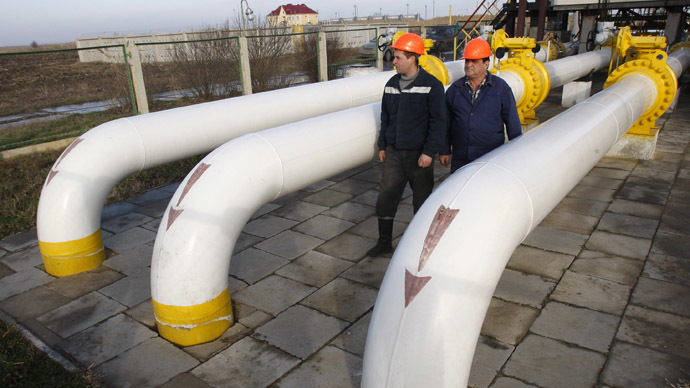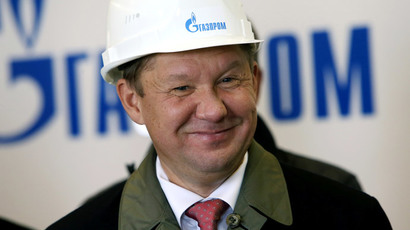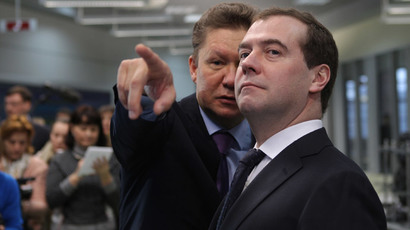Ukraine strikes 3.2 bcm reverse gas flow deal with Slovakia

Energy-pinched Ukraine has reached a deal to start reverse gas flows from Central European neighbors via an unused pipeline to Slovakia. Starting from October, Ukraine will import 3.2 billion cubic meters of gas.
Ukraine and Slovakia signed a memorandum of intent in Bratislava on Monday. The European Commission said the cooperation between Slovakia and Ukraine is a “win-win for both parties”.
“It shows the EU's strong commitment in support of Ukraine's energy sector, which is also reflected in the economic and financial package the Union has swiftly provided for Ukraine in the past weeks. I would like to thank Energy Commissioner Oettinger and his team, who played a central role in paving the way for today’s agreement,” Jose Barroso, President of the European Commission, who attended the ceremony, said in a statement.
By next spring, deliveries from Vojany, Slovakia to the western Ukrainian city of Uzhorod could reach 10 billion cubic meters, the amount European Commissioner for Energy Gunter Oettinger requested.
Deliveries from Slovakia could satisfy up to 20 percent of Ukraine’s natural gas demand, which in 2013 was 55 billion cubic meters.
In April, German energy company RWE started delivering gas to Ukraine using reverse flow through Poland. The gas is being supplied under a 2012 contract where RWE can deliver up to 10 billion cubic meters of gas to Ukraine per year.
Between these two deals alone, Ukraine has upped its supply from Europe ten-fold. Last year Ukraine imported around 2 billion cubic meters of gas from EU member states.
Ukraine imports nearly 50 percent of its natural gas from Russia, a country it now finds itself at diplomatic ends with, as it moves towards possible EU integration. In 2013, the country bought 27.7 billion meters, from Gazprom, Russia’s largest state-owned natural gas producer.
The deal is a short-term solution for Ukraine, which can no longer afford Russian gas after Moscow cancelled all gas discounts for Kiev, as it waits for Ukraine to repay an overdue gas bill of $2.2 billion.
Ukraine’s Energy Ministry was hoping to unlock more gas imports from its European neighbors, but Slovakian authorities must be careful not avoid any legal issues with Gazprom.
Currently Ukraine needs to pay $485 per thousand cubic meters for Russian gas, which compares to $268.5 agreed between Russia and Ukraine in December.
Ukraine currently has a “take-and-pay” contract with Gazprom which it is required to buy 41.6 billion cubic meters of gas in order to receive discount prices. In 2013, Ukraine only bough 12.9 billion cubic meters of gas, which prompted Gazprom last week to send Naftogaz, Ukraine’s state oil and gas company, a bill for $11.4 billion.
Ukraine presidential candidate Pyotr Poroshenko has said that by 2015, Ukraine will stop buying Russian gas. More neighbors may be tapped to start supplying gas to Ukraine, perhaps Poland or Hungary.
Time to diversify?
In the wake of the Ukraine crisis, many of Gazprom's European customers have been second-guessing Russian gas, and have renewed conversations of lessening dependence from their powerful neighbor.
Many countries in Eastern Europe believe the continent can achieve energy security and at the same time retain relations with Russia. Croatian President Ivo Josipovic doesn't see the energy as a zero sum game.
"Diversifying supplies does not mean that the EU’s current gas, oil and coal suppliers, primarily Russia and Norway, will not continue to be important energy partners of the EU. What will change is that EU member countries will have more conceivable alternatives in the interest of energy security," Josipovic wrote in an FT opinion piece on Monday.
Poland's Prime Minister Donald Tusk has been a main proponent of diversifying Europe's imports as well as developing shale, but their is still discord among much of Europe. In terms of developing shale, many states in Europe have banned the practice, while others, like Croatia, are taking a more cautious approach, than say, Poland or the UK.
Latvia, Lithuania, Estonia, Finland, Bulgaria and the Czech Republic import 100 percent of their natural gas from Russia and logically want to diversify their import options. Other countries like Serbia, Croatia, Bosnia, Slovenia, and Italy are very keen to continue doing business with Russia, especially on Gazprom's 'South Stream' project, which by 2018 will supply 64 billion cubic meters of natural gas to European markets.














